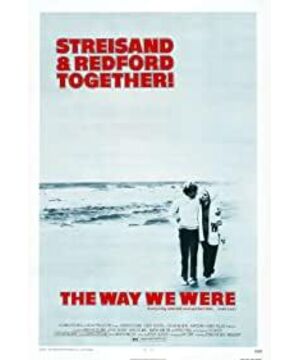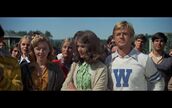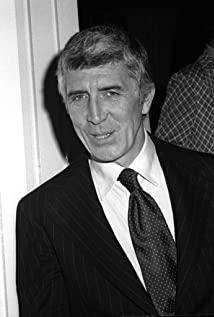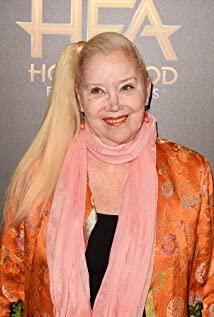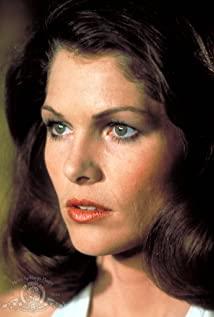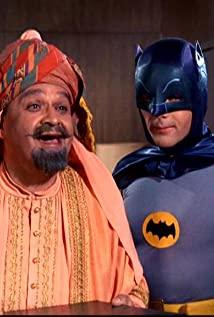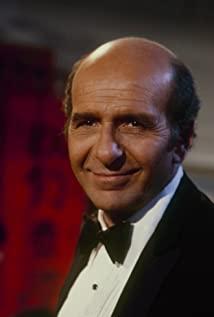Feelings of the Past - Sidney Pollack
This is a love story filmed in 1973. Sidney Pollack is one of the representative directors of New Hollywood, and he is a rare two-part director of film and television in the same period. He directed a large number of TV series, so he is not so prominent in the film industry, but everyone knows one of his famous works, which is also the Oscar for the best film "Out of Africa".
We can see some commonalities between "Once Upon a Time" and "Out of Africa," and one path that Sidney Pollack excels at is through Hollywood melodrama as a non-genre Genre writing conveys the author's own thinking about life and society through the character and fate of the protagonist in the love story, including a mood gradually accumulated by most non-dramatic events, and at the same time uses several groups of characters to show American society. . In this sense, Sidney Pollack was less avant-garde and radical, or less original than his contemporaries, but in another sense he was Facing the reality of American society more directly, it presents the conflicts and contradictions of the society.
The constant mention of this film in "Sex and the City" shows that the film also touched that generation of Americans at that time. This film marked a very extreme era in American history through a love story, that is, the 1960s. Because of the peace movement triggered by the Vietnam War, a generation in the United States took to the streets and was highly radicalized. It is very meaningful. It was in 1973, the year when the United States was forced to withdraw its troops from Vietnam. During this period, American society experienced unprecedented upheavals. American society was deeply immersed in a constitutional crisis. It was a time of crisis in its short history. Unprecedented by the civilization and resistance of the European continent and the third world, it has impacted the traditional mainstream American society and irreversibly transformed American society. In a sense, the American society we know today is officially the result of the 1960s.
Dai Jinhua chose this film because it is a beautiful love story, but it is far more than a love story. It is also the American society of that era, and the emotional integrity, emotional logic and emotional structure of that generation. This love story moved Dai Jinhua. On the one hand, she was still relatively young and had some romantic dreams. But more importantly, in this film, few of the protagonists' personal destiny, emotional experiences, and final choices are impacted, changed, and infiltrated by big times and major historical events. This may also be some of the differences between Dai Jinhua and most of us, we are in a small era, and (Dai) they have no choice but to be in a big era of children. The main difference between the big era and the small era is that the big era deeply impacts and flocks to your personal life at every major historical event and political moment.
This is an era in which no absolute individualism can live alone, no individualism can place itself, isolate society and space, and in the film the protagonist's love tragedy is itself cruelly influenced and changed by major historical and social turning points. of. It expresses a classic love imagination: love across classes. The belief that immortal love triumphs over death, that love as a transcendental emotion can transcend all gulfs.
Believing that love can delight any gap, transcend race, and transcend isolation is a view of love. Believing that love is just an emotion in real social existence, and does not have great changes and transcendence, is another view of love. We can use these two love imaginations to distinguish the two times we live in.
Imagination, thinking and research about class are in a sense taboo in American society, and people rarely discuss class. There is a sociological work that once had a huge impact in China called "Class", and we translated it into "Taste", which can be said to be a cultural misreading. In another sense, this is an accurate description of the class imagination within American society. The difference between classes is not reflected in the gap in social status, but more in different choices presented by taste. There may be two important reasons. One important reason is that in the process of establishing the status of world hegemony in American society after the war, the state of the middle class was rapidly formed. The proportion can account for more than 80%, the gap between the rich and the poor, and the fact of class are particularly unclear. Another reason American society as a whole refuses to discuss its social realities, forming a more consensus level as a whole, is the avoidance of class topics.
This movie is not so much a love that crosses classes, it is better to say that a poor girl falls in love with a rich boy. It crosses social consciousness and social prejudice, as well as the gap in life taste and lifestyle. We have been told this basic fact and the important tone of this love story from the very beginning of the film.
Dai Jinhua said: If you love movies, if you want to study movies in a professional way and enjoy more fun of movies, please don't ignore movie titles, the narration of many movies and the establishment of movie meaning, the challenges and challenges of movie art. The establishment of the audio-visual structure starts from the moment of the opening substrate.
The subtitles of the entire title accompanied by the heroine's singing are a set of parallel montage paragraphs, focusing on the hero and heroine respectively. The alternate editing of the parallel montage shows their two different life contents and attitudes, showing us what the film touches at the end, which is rarely encountered in American Hollywood movies, that is, the reflection on the study of success.
The teacher read the hero Haber's writing in front of his classmates in class, and the last sentence "Americans always smile because success comes so easily." There are two important key words, which are also the differences that form the identities of the hero and heroine , differences in personality, differences in lifestyle, and ultimately lead to serious conflicts in political positions, so that love eventually fades and the relationship eventually aborts. A word is success, the corresponding is failure, loser is a very dirty and dirty word in American English, a very vicious curse. Another key word is easy, another semantic is light, game, entertainment. In contrast to the heroine's serious attitude towards life, it is extremely full of game spirit, putting many things out of the way, reporting a kind of ridicule, Excellent protagonist to judge and speak. The male protagonist is always excellent, successful, and above all, he is always easy. There is a very interesting moment in the film, the heroine asks the hero if there is anything difficult for you, the hero does not speak, hesitates for a moment and finally kisses her, it is not easy for him to love this girl.
In the story of love, the film simultaneously deals with the history of the United States before and after the war, and at the same time tries to deal with one of the most important basic issues and conflicts in the world after World War II, namely left-wing and right-wing, radical and conservative, communism ism and fascism, communism and capitalism.
The highly individual nature of love and the socio-political group nature are perfectly combined in this film. It contains several narrative spaces. The first layer of narrative space is the reunion of the hero and heroine in New York during World War II. Then a flashback takes us to a tense moment in the 1930s when all of Europe was in the midst of a rousing drumbeat, with communism facing fascism head on and liberalism sitting on the sidelines. Back to the middle of World War II, and finally to the postwar life of the 1950s.
Closely related to the fate of the protagonist in the film are the darkest scandals in American history in the late 1950s, McCarthyism, large-scale and brutal interference in the political beliefs and political choices of citizens by the Un-American Activities Committee, and widespread surveillance and violations. The intolerable everyday facts of American life and it is at this grim moment that the story is reversed and the film ends with the heroine distributing leaflets on the street against nuclear war, the time when the film was made (1973 ) is a moment of origin, when the anti-war sparked by the Vietnam War is about to sweep and rewrite American society. Pure love is never set in this film, it just shows a kind of love full of intensity. In order to hold this love and enjoy this love, the hero and heroine make compromises and changes, but some bottom lines cannot be broken through. may be changed, because to change these things is to betray oneself.
In this film, the most subtle grasp handled by the director is a kind of difference. The gap in social class also makes some understanding impossible. For example, the hero used to ask the heroine are you always so busy? Do you have to make yourself so tired? Obviously do not understand that a girl from a poor family in New York cannot have so much autonomy and leisure, in addition to her beliefs and choices, there is the most basic survival.
Poor girls and rich boys are accomplished through several layers of identities, including Jewish and non-Jewish, Jewish girls and non-Jewish white boys. In their jokes, this identity is constantly emphasized. Another is the American campus culture, which respects the winners of sports competitions. The male protagonist enjoys this honor very easily and is good at controlling the whole process of the game. And the heroine is working, persevering, and preaching. At the beginning of the story, the hero is talented, and the heroine is serious and hardworking, but it still cannot change the fact that she has no talent.
The dramatic conflict in the first act is that the heroine puts a lot of effort into writing a novel, while the hero, on the other hand, doesn't care. When the teacher said to read an excellent work, the heroine was nervous and had a huge loss, because the composition read was the work of the hero. What comes out of this is the playful and boring, concrete presentation of the class differences that the hero and heroine outline to us through very subtle details.
The film uses two cities to symbolize two different systems. One is Los Angeles and New York. Los Angeles corresponds to Hollywood. Hollywood's film industry handles a large amount of capital flow, and it is also a successful life swallowed by money in the mainstream of American society. New York corresponds to literature, a pure ideal of literature, an insistence on social justice and responsibility. This is also an important parameter that the hero and heroine are closely intertwined and finally part ways.
What's interesting is that in 1973, the new Hollywood director made a movie whose identity is on the heroine's side, which is an interesting choice for a love story, including an artistic choice, a choice of identity. When the hero and heroine met, the director deliberately used symmetrical cross-cut shots between the two of them. This shot is uncommon in the normative language of Hollywood movies, and symmetrically cut shots show two sides that are evenly matched, or friends who share life and death, and more often, couples who are destined to love each other. At the beginning of the film, the two people are given symmetrical cross-cut shots, and the two people are given a stable composition. The double medium shot visually connects them more closely than the plot, and shows their destined love. Such compositions and conventions of character representation will occur gradually.
McCarthy's darkness has been cast into the Hollywood film industry. When the screen was just put down, there was a screeching sound. Picasso's famous painting was torn apart, leaking a bug hidden behind the painting, and citizens' lives and liberties were seriously violated. In a democratic American society, this is a traumatic event for Americans who believe in the inviolability of civil rights. A dramatic turn begins when the heroine, who has given up her political ideals, faces a choice. Even if the older woman asks the heroine, "Who would you choose between him and the ideal?" The heroine chooses "he", but there are still some basic social morals and responsibilities that the heroine has no choice but to abandon.
Knowing that the heroine is preparing to go to a protest in Washington, the hero deliberately pretends not to know at home, this is already a compromise for him, when he has to face and convince his wife, the visual choice of the film For the first time there was a reversal—that is, Katie began to appear in a smaller set, in a larger visual representation. If the female protagonist is the middle shot, the male protagonist is Xiaoquan. The female protagonist is a close shot, and the male protagonist is a medium shot. The female protagonist is a close-up, and the male protagonist is a close-up. The different settings of the clear scenes begin to show that the director's vision recognizes the hostess.
The heroine is a suitor from beginning to end, humbled and compromised because of love. The hero who succeeded too easily, chose to compromise and give up amid social violence, social reality and the temptation of successful people. A series of turning factors began to appear, the hero's derailment, the hero's indifference, he witnessed other colleagues lose their jobs under the political persecution, and just wanted to keep himself close, as a rich family, as a person who succeeded too easily, he Said it was my first job and I wanted to keep it. At this time, the two cities began to confront New York or Los Angeles, literature or film, which basically means high remuneration, and the external symbol of success is enviable material foundation and social status. for exchange.
And the heroine is still the humble one who loves. But she couldn't make a compromise on this bottom line. After the delivery room, the water waves of New York were stacked on top of Katie's close-up, and then the city street scene of New York appeared. The story transitioned to the final heroine's curly hair became external. The image of the Jewish girl, changing from the elegant high-society housewife to the return, becomes a return in the sense of the story. In the film, the heroine crosses the road for the hero again and again, and the last time the hero crosses the road for the heroine. She took the initiative to take a flyer from her hand, which showed the male protagonist's respect for different lives and the courage to insist on what he did not have. The final dialogue was certified as
Male protagonist: "Everything is too easy for you" Female protagonist: "I can afford to lose, because I have lost too much, so I have experience" is the tribute of the winners to the losers, and the courage of the losers In order to persevere, express the American spirit on another level.
View more about The Way We Were reviews


